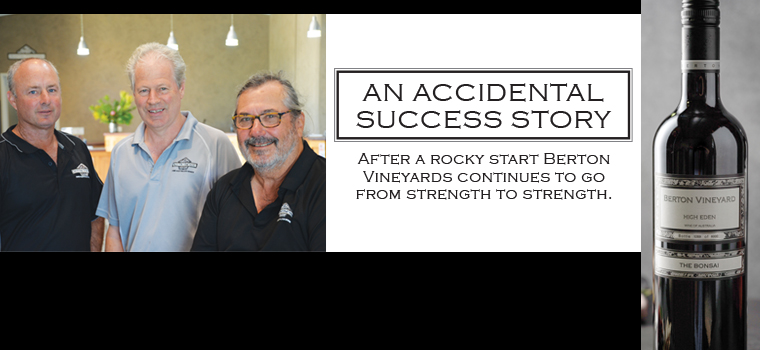After a rocky start Berton Vineyards continues to go from strength to strength.
"By the time they managed a first vintage the vines still looked like rootlings and a friend jokingly named it the bonsai vineyard – a name that’s stuck and is now attached to Berton Vineyards top ranking shiraz."
NIGEL HOPKINS
ALTHOUGH Bob Berton’s winery is now one of the top 20 wineries in Australia, and is its ninth largest wine exporter, he admits its growth over the past 25 years has been “all accidental”.
Berton Vineyards had its start in 1995 when Bob and his wife Cherie bought just over 30ha of land in High Eden, a higher altitude sub-region of the Barossa Valley. For Griffith-born Berton, who’d had senior management roles with De Bortoli and Miranda, it represented a chance to embark on a joint family project.
“We were in our mid-forties and realised we hadn’t done a lot together,” he says. “The idea was to have a little vineyard and live in the Adelaide Hills.”
It didn’t work out quite like that. They planted 4ha of shiraz and three of chardonnay – since then there’s been plantings of cabernet sauvignon and sauvignon blanc, bringing the total planted to around 12.5ha. They had no water – still haven’t, with a dry dam for the past three vintages – and had to rely initially on water from neighbouring Mountadam.
By the time they managed a first vintage the vines still looked like rootlings and a friend jokingly named it the bonsai vineyard – a name that’s stuck and is now attached to Berton Vineyards top ranking shiraz.
“It was, in fact, a disaster at first,” Berton says. By 1999 he and Cherie had moved from the shed and caravan where they’d been living with their children into a new home, and he was working with Miranda Wines at Rowland Flat, to whom he was also selling his grapes: “Life was generally beautiful,” he says.
But then he had a call from a winery back in Griffith that was having problems and asked for his help. With a small group of partners he took over and focussed the business on exporting wines that they’d bought and blended. By then the Berton’s family aim was to build their own small winery to process the 100 or so tonnes of fruit from their High Eden vineyard. On the brink of doing just that in 2005, fate intervened.
“Rosemount had bought Penfolds, who had a mothballed winery at Yenda, near Griffith,” Berton says. With three partners – Jamie Bennett, Paul Bartholomaeus and James Ceccato – they formed Berton Vineyards as a company, which bought the Yenda winery.
“Every now and then you reach a fork in the road,” Berton says, describing the turn of events that took him from his dream of a small winery in the northern Adelaide Hills to one of Australia’s largest based in the Riverina. “But we made it work.”
Suddenly Berton had a 20,000-tonne capacity winery which, in its first vintage in 2006, crushed 10,000 tonnes, much of it contract processing for others. This year they’ll crush around 17,000 tonnes, some 40 per cent of that as contract processing.
That still leaves an awful lot of wine to market – some 12 million bottles in 2019 – under the Berton Vineyards 35 or so labels, including the original Bonsai Shiraz (retail around $40) and its “cornerstone wine” the Metal Label Black Shiraz (around $14).
As well as impressing Winestate’s judges, Berton Vineyards has achieved terrific national and international recognition with two trophies, six double gold medals and 35 gold medals in 2019 alone.
Although most of Berton Vineyards wines are at the relatively inexpensive end of the market they have been universally acknowledged as great value for money. “I want us to be the best at any price point,” Berton says. “We don’t cut any corners in our winemaking.”
Having built good export links very early in the piece, Berton Vineyards continues to have a strong export focus, with particular strength in the UK as one of that country’s top four on-premise wine suppliers (pre-COVID-19 that is). Berton says they’re also “amazingly” strong in Russia, with “good listings” in Scandinavia and a foothold in India, though still weak in the US.
With the loss of China as an export market the company’s export vs. domestic balance has moved from 50:50 to 55 per cent domestic sales and 45 per cent export. Despite this Berton Vineyards domestic recognition is probably much smaller than it deserves, partly due to Berton’s decision not to sell through the major retail chains but to stick with smaller independent wine retailers.
“We’re relying on people discovering us,” he says. “We can’t afford to spend millions on advertising, which would force us to make our wines more expensive. I just won’t do it. We’re going to be around for a while – and we’re patient.
“What’s in the bottle is our priority. In our case, the marketers haven’t taken over. For us, it’s not just a product – it’s wine.”
Will there be more forks in the road, more growth?
“I think we’ve reached our proper size,” Berton says. “Currently 40 per cent of our business is other people’s labels. My goal now is to sell everything we make under our own label.”

